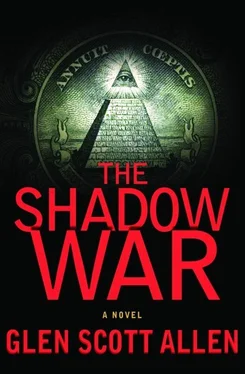Glen Allen - The shadow war
Здесь есть возможность читать онлайн «Glen Allen - The shadow war» весь текст электронной книги совершенно бесплатно (целиком полную версию без сокращений). В некоторых случаях можно слушать аудио, скачать через торрент в формате fb2 и присутствует краткое содержание. Жанр: Триллер, на английском языке. Описание произведения, (предисловие) а так же отзывы посетителей доступны на портале библиотеки ЛибКат.
- Название:The shadow war
- Автор:
- Жанр:
- Год:неизвестен
- ISBN:нет данных
- Рейтинг книги:5 / 5. Голосов: 1
-
Избранное:Добавить в избранное
- Отзывы:
-
Ваша оценка:
- 100
- 1
- 2
- 3
- 4
- 5
The shadow war: краткое содержание, описание и аннотация
Предлагаем к чтению аннотацию, описание, краткое содержание или предисловие (зависит от того, что написал сам автор книги «The shadow war»). Если вы не нашли необходимую информацию о книге — напишите в комментариях, мы постараемся отыскать её.
The shadow war — читать онлайн бесплатно полную книгу (весь текст) целиком
Ниже представлен текст книги, разбитый по страницам. Система сохранения места последней прочитанной страницы, позволяет с удобством читать онлайн бесплатно книгу «The shadow war», без необходимости каждый раз заново искать на чём Вы остановились. Поставьте закладку, и сможете в любой момент перейти на страницу, на которой закончили чтение.
Интервал:
Закладка:
"And your father? When did he know?"
"Only shortly before then. Only when he began to read the books that had been suppressed for decades."
Benjamin was shocked. "You mean, he knew nothing of his own father's life?"
"Benjamin," she said, almost pleading. "You just do not understand what it was like. The Revolution wiped out not just individuals, but whole families, entire villages. History itself. Most people did not want any record to survive of who they had been before the Revolution. My father literally knows nothing of his father's life before 1917. He is not even certain of his father's birthplace. The name Orlov is as common in Russia as is Smith or Jones in America. His father probably took it to replace his real name that was, for some reason, unacceptable. Nikolai knows only that his father appeared in Maikop, in the North Caucasus, in 1918, married his mother… and then worked for the security services. He never spoke of his life before the Revolution, and never of his work after it."
Benjamin wanted to offer solutions. "Have you tried searching records?"
Natalya shook her head. "There are no records to search." She gave him a slight smile. "It is not like America, where you simply go to the library and begin to trace backward. In Russia, at some point, all such searches reach a blank wall."
"But your other relatives, they must-"
"They have their own secrets to keep," she said firmly. "That is what you do not understand. For seventy-five years, what happened yesterday or the day before was not just unimportant, it was a threat, something that might be used against you by one of your 'comrades.' And what happened before the Revolution… it was another epoch."
"Such secrets… they aren't your fault."
"Someone once said, Benjamin, that in Russia, everything is a secret, and nothing is a mystery. The details of my grandfathers' lives are the secret. But why they chose the path they did, that is no mystery. For the same reasons millions of others did the same things: to survive."
By now the bar-restaurant had become even more crowded, as there simply weren't that many places in Dubna for people to unwind after a hard day of physics seminars. Their table was surrounded by people for whom there was nowhere to sit. In addition, a small band had begun to play music-which included a balalaika, which Natalya said "drives me crazy."
Benjamin thought of something. "Will they let us take wine to our room?" he asked.
"This is Russia," she said. "The only rule about drinking is to never do it… what do you call it? Half-assed?"
Benjamin managed to flag down a waiter, ordered another bottle of the Moldavian wine, paid the bill, and then, using his body as a flying wedge, led Natalya from the bar.
When they were back in their room, Benjamin realized they had no way to open the wine.
"Here," said Natalya, "give it to me. We don't need a bourgeois bottle opener."
She located a pen, asked for Benjamin's shoe, then took these and the bottle into the bathroom. Balancing the bottle over the sink, she pounded the pen into the wine cork using her shoe as a hammer. At an especially forceful stroke, the cork plummeted into the bottle, sending wine spouting up into her face and hair. Laughing, she took a drink directly from the bottle, handed it to Benjamin.
"Now we drink Soviet style," she said.
Benjamin could tell Natalya was forcing herself to drink and make jokes as though they truly were the Levebres, here on holiday, as a way of distancing herself from her confession in the bar.
When the bottle was nearly empty and Natalya clearly half drunk, she crawled across the bed where they'd been sitting and, taking Benjamin's head in her hands, kissed him passionately on the mouth.
Benjamin started to resist. "If you don't-"
Natalya looked into his eyes. "No, Benjamin," she said, "I truly do."
And so they made love again; only this time, Natalya's hands held his body with a kind of desperation. She pressed against him with an ardor that was hunger.
"Please," she said, "let's make love like we are animals. Creatures without thoughts, without words."
Benjamin held her, made love to her. Made love with her.
Later, very late in the night, she was lying with her head on his shoulder and he was stroking her hair.
"Natalya…," he began.
Natalya didn't respond, and he decided she was asleep. But she was breathing softly with her eyes wide open.
Later still, after Benjamin's chest rose and fell with the regular breathing of deep sleep, Natalya was still awake. She looked down at Benjamin, ran her hand lightly over his hair.
"Ya lyublyu tebia tozhe," she said, almost in a whisper.
CHAPTER 42
As their small, rickety, pale blue bus bounced over the rough country road to Ratmino, through ever thicker pine forests, Benjamin caught glimpses of a wide, powerful river beyond the trees.
"And that is?" he asked, pointing.
"The Volga," answered Natalya.
"It's beautiful," said Benjamin.
The bus was crowded, almost entirely with older women, who Natalya had called babushkas. As far as he could tell, Benjamin was the only non-Russian on the bus.
Natalya explained that the church to which they were going-the Sobor Pokhvali Presviatoy Bogoroditzy, or the Church of Our Praised Lady, built in 1827-was more than just a village chapel; it was in fact a cathedral, the largest and most important church in the "oblast." Since the rehabilitation of the Orthodox Church into Russian life, this particular church had received a constant stream of both the ardently faithful and the simply curious.
She was sitting very close to him, holding his hand; he'd noticed all morning that the distance he'd sensed the day before was gone. He didn't know whether Natalya was simply beginning to trust him, or if her feelings ran deeper. As deep as his did, now.
"When Lenin came to power, he had the churches closed, dozens of priests were shot by the Cheka. They destroyed architectural treasures, like the seventeenth-century church of St. Paraskevi. Children were told to bring icons from churches to throw on public bonfires. The rural churches were stripped of anything of value and then turned into storage sheds for vegetables."
"But this one has been restored?"
"It was luckier than most. The local peasants buried the icons and kept their location secret for seventy-five years. Then, after perestroika, they dug them up, restored them to the church."
"Remarkable," Benjamin said. "Such… endurance."
"It is not just endurance," Natalya said. "The Russian people are perhaps as superstitious as they are religious. The two reinforce one another."
"What do you mean?"
"Well," Natalya said, "here is an example. In June of 1941, Stalin's archaeologists discover Tamerlane's burial site. There was a local legend that it was cursed, that if Tamerlane's sarcophagus was opened, the war god, as he was known, would visit catastrophe on the blasphemers within three days. Stalin pays no attention, orders the sarcophagus opened. A photograph was made of one of the archaeologists holding Tamerlane's skull aloft and sent immediately to Stalin."
Benjamin looked intrigued. "And?" he said.
"That was June 19. Three days later, Germany invaded the Ukraine," she said. "It was a disaster. The Germans moved through Western Russia like a whirlwind." Natalya smiled. "Suddenly, the 'godless Communist' Stalin ordered that the churches in Moscow be reopened, and he invited the Patriarch to the Kremlin for consultation. The Patriarch insisted that one of the most highly valued icons of the Orthodox Church, the Icon of the Mother of God of Kazan, be taken out of 'safe keeping' where it had been put by the Party, and that it be carried from Leningrad to Moscow to Stalingrad in a sort of religious procession; that such a pilgrimage would create a ring of protection around the three major cities, a ring the Germans would never break. Stalin agreed, the procession was made, and none of the three cities ever surrendered."
Читать дальшеИнтервал:
Закладка:
Похожие книги на «The shadow war»
Представляем Вашему вниманию похожие книги на «The shadow war» списком для выбора. Мы отобрали схожую по названию и смыслу литературу в надежде предоставить читателям больше вариантов отыскать новые, интересные, ещё непрочитанные произведения.
Обсуждение, отзывы о книге «The shadow war» и просто собственные мнения читателей. Оставьте ваши комментарии, напишите, что Вы думаете о произведении, его смысле или главных героях. Укажите что конкретно понравилось, а что нет, и почему Вы так считаете.












